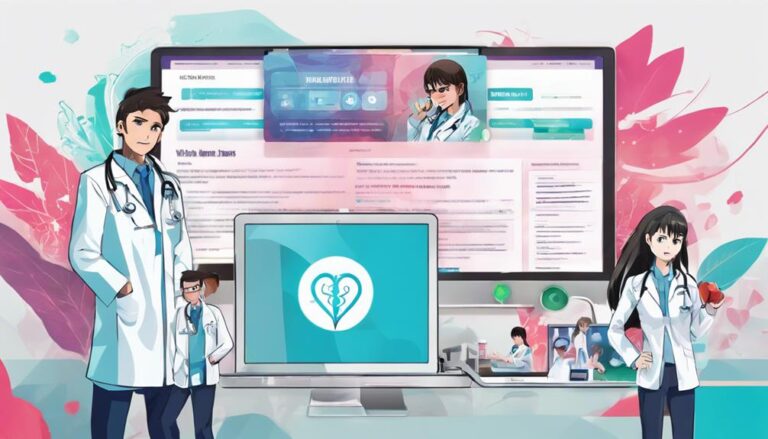Social Media for Healthcare: Dos, Don'ts, and Best Practices
When utilizing social media for healthcare, remember to actively engage patients, safeguard patient confidentiality, and prioritize trust-building. Respond promptly, share valuable information, and engage in two-way communication to empower patients. Manage your online reputation effectively by showcasing positive feedback and addressing negative comments professionally. Integrate compliance regulations into your social media practices to maintain integrity and trust. Remember to harness the power of visual content for effective communication. Measure your success, stay updated on social media trends, and adapt your strategies accordingly. Understanding these dos, don'ts, and best practices is key to optimizing patient engagement and online presence effectively.
Key Takeaways
- Prioritize patient confidentiality and privacy.
- Engage transparently and ethically with patients.
- Provide accurate health information and resources.
- Monitor feedback and respond promptly.
- Stay updated on compliance regulations and trends.
Importance of Social Media in Healthcare
In healthcare, utilizing social media is essential for reaching and engaging with patients effectively. Patient engagement plays a vital role in providing quality healthcare services, and social media platforms offer a direct channel for healthcare providers to interact with their patients. By actively engaging with patients through social media, healthcare professionals can enhance communication, provide valuable health information, and address patient concerns promptly.
Moreover, social media is a powerful tool for building brand awareness in the healthcare industry. Establishing a strong online presence can help healthcare organizations showcase their services, expertise, and values to a broader audience. Through strategic use of social media platforms, healthcare providers can increase visibility, attract new patients, and differentiate themselves from competitors in the industry.
Ethical Guidelines for Healthcare Professionals
When adhering to ethical guidelines, healthcare professionals must prioritize integrity and patient welfare above all else. Ethical dilemmas often arise in the use of social media by healthcare professionals, requiring a strong understanding of professional boundaries. It's vital to maintain patient confidentiality and privacy at all times, refraining from sharing identifiable information or engaging in conversations that could compromise patient trust. Upholding these ethical standards not only protects patients but also safeguards the reputation and credibility of healthcare providers.
Professional boundaries should be clearly defined to prevent any misunderstandings or inappropriate interactions. Healthcare professionals must exercise caution when interacting with patients online, ensuring that communication remains professional and respectful. It's essential to avoid dual relationships that could blur the lines between personal and professional connections.
Building Trust With Patients Online
To establish trust with patients online, prioritize transparent communication and consistent engagement through social media platforms. Patient communication is crucial in building a strong rapport and credibility in the digital healthcare landscape. By maintaining open and honest dialogues with patients online, you can foster trust and loyalty. Consistency in engagement is equally essential; make sure to respond promptly to messages, comments, and inquiries. Demonstrating availability and attentiveness goes a long way in assuring patients that their concerns are valued.
| Patient Communication | Trust Building | Action Items |
|---|---|---|
| Use clear language and terms that patients understand. | Engage with patients regularly to show your commitment. | Respond to patient queries within 24 hours. |
| Encourage two-way communication for feedback and questions. | Share patient testimonials or success stories (with permission). | Schedule live Q&A sessions to address common patient concerns. |
| Provide resources and educational materials for patient empowerment. | Be transparent about any limitations or risks in treatments. | Share relevant articles or research to keep patients informed. |
Leveraging Social Media for Patient Education
Leverage social media platforms as powerful tools for educating patients about healthcare topics and treatment options. Patient engagement is vital in healthcare, and social media offers a unique opportunity to provide informative content that empowers individuals to take charge of their health. When creating educational posts, focus on delivering accurate information in a clear and accessible manner. Use visuals, such as infographics or videos, to enhance understanding and engagement.
Interactive features like live sessions or Q&A sessions can further enhance patient education by allowing for real-time communication and clarification of doubts. Encourage feedback and questions to foster a two-way conversation that promotes active participation. Tailor your content to address common queries, debunk myths, and provide practical tips for maintaining health.
Remember to maintain patient confidentiality and adhere to regulatory guidelines when sharing healthcare information on social media. By leveraging these platforms effectively, you can establish trust, build credibility, and make a positive impact on patient education and well-being.
Managing Online Reputation Effectively
Enhance your healthcare organization's credibility and trustworthiness by effectively managing your online reputation. Online crisis management and reputation monitoring are essential aspects of maintaining a positive image in the digital world. Responding promptly and professionally to any negative feedback or misinformation can help mitigate potential damage to your reputation.
To help you navigate the domain of online reputation management, consider the following best practices:
| Online Reputation Management Tips | Description |
|---|---|
| Monitor Feedback Regularly | Stay informed about what patients are saying online. |
| Respond Promptly | Address any concerns or complaints in a timely manner. |
| Showcase Positive Reviews | Highlight satisfied patient experiences. |
| Transparency is Key | Be open and honest in your interactions online. |
| Seek Professional Help | Consider hiring experts for complex reputation issues. |
Integrating Compliance Into Social Media Practices
When integrating compliance into your healthcare social media practices, make sure you have a clear understanding of the guidelines in place.
Train your staff on these compliance regulations to guarantee a unified approach across all social accounts.
Regularly monitor your social media platforms to maintain adherence to compliance standards and address any issues promptly.
Compliance Guidelines Overview
To guarantee compliance with regulations, integrating compliance guidelines into your social media practices is essential for healthcare organizations. Staying up to date with regulatory updates and implementing robust compliance strategies will help maintain the integrity of your online presence.
Privacy concerns and data protection are paramount in healthcare, making it critical to verify that all social media activities align with strict privacy regulations. By incorporating these guidelines into your social media practices, you can build trust with patients and safeguard sensitive information.
Training for Staff
Integrating compliance guidelines into your staff training on social media practices is essential for ensuring regulatory adherence in healthcare organizations. Staff education plays a significant role in upholding the standards set forth by regulatory bodies.
Continuous learning is important to keep up with the ever-evolving landscape of social media. By providing thorough training sessions, healthcare organizations can equip their staff with the knowledge and skills needed to navigate social media platforms responsibly.
Emphasizing the importance of compliance during these training sessions reinforces the significance of following guidelines to protect patient privacy and maintain professionalism online. Implementing regular training updates ensures that staff members stay informed about any changes in regulations, fostering a culture of compliance within the organization.
Monitoring Social Accounts
For effective compliance and regulation adherence, closely monitoring social media accounts in healthcare settings is essential. Crisis management and social listening are vital components of this monitoring process. Crisis management involves promptly addressing any negative feedback, complaints, or misinformation that may arise on social media platforms.
By actively monitoring social accounts, healthcare organizations can identify and address potential issues before they escalate into larger problems. Social listening allows healthcare providers to gather valuable insights from patient feedback, concerns, and trends, enabling them to enhance services and communication strategies.
Regularly monitoring social media accounts not only guarantees compliance with regulations but also helps maintain a positive online reputation and fosters trust with the community.
Engaging With Patients Responsibly
Engage patients responsibly by actively listening to their concerns and providing timely, accurate information. Patient engagement is key in healthcare social media interactions. Communication strategies should focus on creating a safe and welcoming environment where patients feel heard and valued. Respond promptly to messages, comments, and inquiries, showing empathy and understanding in your interactions.
When engaging with patients, it's essential to maintain professionalism and confidentiality. Avoid sharing any personal or sensitive information in public forums. Instead, direct patients to secure channels for discussing private matters. Utilize language that's easy to understand, avoiding medical jargon that may confuse patients.
Encourage patients to share their feedback and suggestions openly. Acknowledge their input and demonstrate a willingness to address any concerns they may have. By fostering open communication and building trust, you can create a positive patient-provider relationship on social media platforms. Remember, patient engagement goes beyond just responding—it involves actively listening, providing support, and offering valuable information to enhance their healthcare experience.
Harnessing the Power of Visual Content
To enhance your healthcare social media presence, consider leveraging the impact of visual content to captivate and inform your audience effectively. Visual storytelling plays a vital role in engaging your followers and conveying complex healthcare information in a more digestible and memorable manner. Incorporating images, infographics, and videos can help humanize your brand, making it more relatable and trustworthy to your audience.
When using visual content, it's important to maintain consistency with your brand aesthetics. Make sure that the colors, fonts, and overall style align with your healthcare organization's branding guidelines. Consistent visuals help reinforce brand recognition and build a cohesive online presence across different social media platforms.
Measuring Success and Impact
Measuring the impact of your healthcare social media efforts is vital in evaluating the effectiveness of your online presence and engagement strategies. Impact assessment allows you to understand how well your content resonates with your audience, the reach of your messages, and the overall success of your social media campaigns.
To effectively measure your success and impact, utilizing measurement tools is essential. These tools can provide insights into key metrics such as engagement rates, click-through rates, conversion rates, and audience demographics. By analyzing these metrics, you can identify what's working well and where there's room for improvement in your social media strategy.
Some commonly used measurement tools in social media include Google Analytics, social media analytics platforms like Hootsuite or Sprout Social, and native platform analytics offered by social media sites themselves. Regularly monitoring and analyzing these metrics will help you make informed decisions to optimize your social media presence for better engagement and results.
Staying Updated on Social Media Trends
Staying informed about current social media trends is vital for maintaining a relevant and effective online presence in the healthcare industry. Trend analysis allows you to stay ahead of the curve and adjust your social media strategies accordingly. By keeping an eye on emerging trends, you can better engage with your audience, drive traffic to your platforms, and ultimately improve patient outcomes.
Platform updates are another essential aspect of staying current in the rapidly evolving social media landscape. Social media platforms frequently introduce new features and algorithms that can impact how your content is seen and shared. Regularly checking for platform updates guarantees that you're leveraging the latest tools to maximize your reach and engagement. It's also important to adapt your content strategy based on these updates to maintain visibility and relevance.
Conclusion
To sum up, integrating social media into healthcare practices can be a game-changer for patient engagement and education.
By following ethical guidelines and building trust, healthcare professionals can effectively utilize platforms to enhance their online reputation and connect with patients.
Keep in mind, staying updated on social media trends is essential for success in this digital age.
So, go ahead and explore the world of social media for healthcare – the possibilities are endless!







